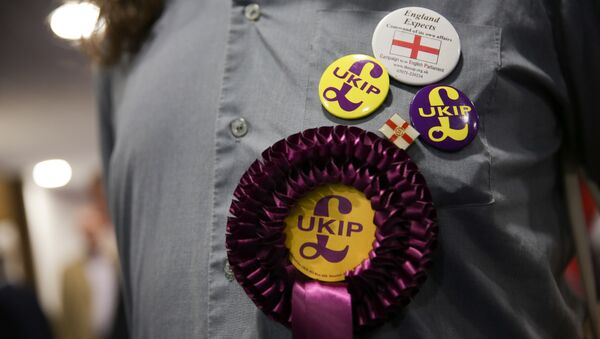It's not the only thing to remind us of the year of the Royal Wedding and Ricky Villa's classic-winning goal in the Cup Final for Spurs. The SDP are back too. Yes, that's right, the SDP.
The party that caused such an impact when they launched 37 years ago are enjoying quite a revival.
Last week, they gained their first MEP, when Patrick O'Flynn, the former Daily Express journalist, joined them from UKIP. Will Nigel Farage, who announced he was leaving UKIP on Tuesday, be their second?
READ MORE: UKIP Ex-Leader Nigel Farage Quitting Party Amid Brexit Row
It seems quite ironic that the SDP, who were formed in the early 1980s by pro-EEC Labour MPs opposed to the Labour left's Euroscepticism, should be the new, natural home for those wanting to leave the EU.
But times have changed.
The SDP of 2018 still espouses social democracy as it‘s always done. But it recognises that the EU today is a very different animal to the EEC of four decades ago.
The future can only look much brighter for the @TheSDPUK because of it. An influx of memberships and tonight there will be councillor's, MEP's and so on questioning their own political support.
— Chris Stevenson SDP (@cstevensonSDP) 27 ноября 2018 г.
Let's be clear, only The #SDP stand firm on #Brexit where others are MIA. pic.twitter.com/ZoiH5hlGUf
In its ‘New Declaration', published in November, the SDP pledges to uphold the Brexit Referendum Mandate.
"The evident disdain of the Westminster class for, among others, many elderly and low-income voters revealed that the powerful only tolerate democracy when their views prevail," the document says.
The SDP attacks what it calls "supranationalism", calling it "a neoliberal ideology aimed at neutering domestic politics and placing the most important issues beyond the reach of ordinary voters."
It states quite boldly that the EU — nor indeed any supranational entity- ‘is not- and will never be- a social democratic enterprise'.
READ MORE: 'Batten Might Be Keeping Seat Warm': Tommy Robinson Could Soon Be UKIP Leader
The SDP supports a mixed economy, such as Britain enjoyed in the period 1945-79. They criticise the privatisation of the railways and utilities and the selling off of Britain's national assets to foreign ownership. They take a pop at the Lib Dems for their embrace of neoliberalism, and both the right and the left for their adoption of socially-divisive identity politics.
"For many years the liberal-left has abandoned the politics of solidarity for those of individual emancipation, without realising that putting differences above common bonds can harm mutuality," they say, echoing the words of sociologist Steve Hall, co-author of The Rise of the Right and The Death of the Left.
On foreign policy, the New Declaration lambasts what it calls the 'disastrous attempts to impose liberal democracy on complex societies in the Middle East via military intervention'. It states quite clearly ‘Western powers must learn to respect sovereign frontiers'. It advocates live and let live.
The SDP claim that their declaration represents the true ‘centre ground' of British politics, and it's hard to argue otherwise. Most of the positions they put forward would be supported by a majority of the electorate- as opposed to a majority of the punditocracy or the political/financial Establishment. They offer a mix of economic radicalism, democratic populism and small ‘c' social conservatism-stressing that government ‘must defend and support family life wherever possible'.
READ MORE: Let's Get This Party Started! New UK 'Democrats' Suggested by Anti-Brexiteers
In fact, the SDP programme is likely to prove attractive not only to moderate UKIPers, who want to leave the EU, but who aren't keen on a Thatcherite post-Brexit vision for Britain and to Lib Dems too, who (a) don't share the party leadership's fanatical Europhilia and (b) don't like its embrace of ‘Orange Book' neoliberalism post-Charlie Kennedy. It might also attract Labour supporters, worried about the party back-sliding on Brexit and from old-style One Nation Tories who are sick of austerity and privatisation.
Vince Cable: I can offer the same formula as Macron https://t.co/Pa2OOGirr3
— BBC Politics (@BBCPolitics) 21 июля 2017 г.
What the declaration does expose is just how far politics in Britain has moved to the neo-liberal, crony-capitalist right on economic matters and the cultural Maoist ultra-left on social/cultural ones, since the halcyon days of the SDP in the early 80s. The truth is that if we take out Jeremy Corbyn and the still relatively small number of Labour MPs who actually support his democratic socialist programme, the SDP in 2018 are to the left of most of the PLP on economic issues.
The New Declaration though could be a game-changer.
By attacking neo-liberalism, illegal regime-change wars and declaring their support for enacting the result of the Brexit Referendum, the SDP have put clear distance between themselves and the Inside the Tent, anti-democratic ‘centre ground' phoneys. Meanwhile, across the Channel, Emmanuel Macron, memorably described by George Galloway as ‘Tony Blair with garlic', faces a new French Revolution.
READ MORE: 'Worst Possible Outcome': Brexit Deal Would Make EU Rule Taker — UK Politician
Fake centrism is in crisis — there‘s no two ways about it.
We could be witnessing the construction of a new political paradigm, which is most welcome and indeed long overdue.
Follow Neil Clark on Twitter @NeilClark66 & @MightyMagyar
Support his Anti-Stalker Crowdfund
The views and opinions expressed in this article are solely those of the author and do not necessarily reflect those of Sputnik.




